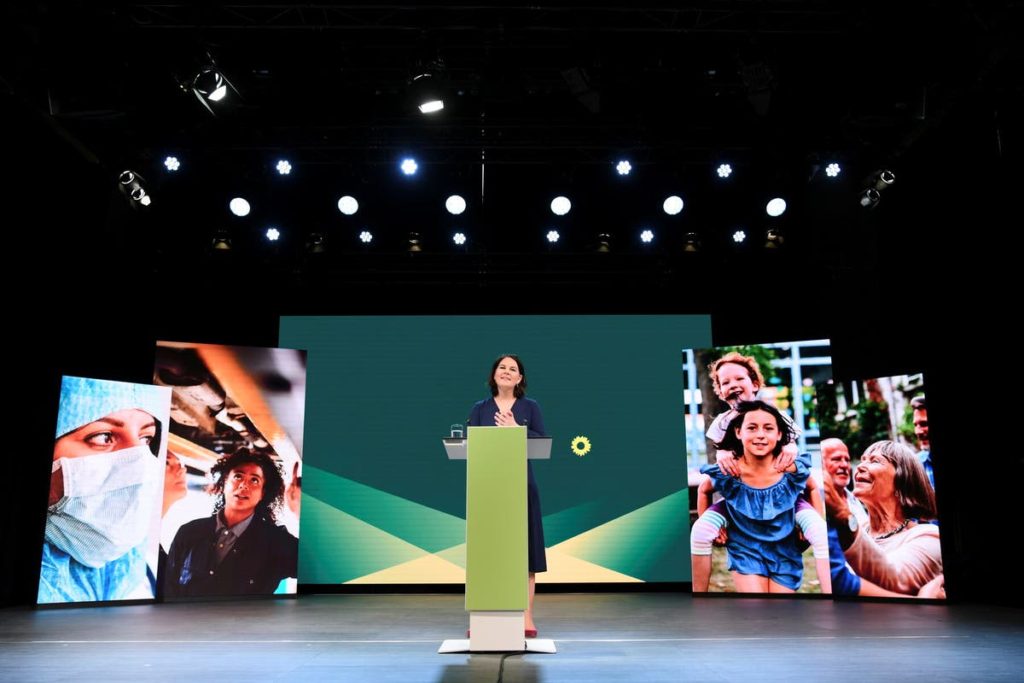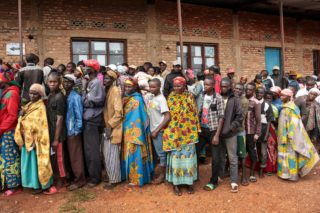BERLIN — Germany’s Greens announced Monday that Annalena Baerbock would be the party’s candidate for chancellor, betting that the 40-year-old was their best choice to replace Angela Merkel as leader of the country.
With polls showing the Greens in second place nationally behind the conservatives, with support of around 22 percent, the party has a serious crack at the chancellery for the first time since it took its modern form in 1993. Ms. Baerbock is their first serious candidate for chancellor.
By selecting her over the party’s other co-leader, Robert Habeck, 51, the Greens are positioning themselves to appeal not only to Germans drawn to the party’s traditional stance on environmental protection, but as a more dynamic, youthful presence in a country that has been under the leadership of the same conservative chancellor for 16 years.
“I want to make an offer with my candidacy for the whole of society,” Ms. Baerbock said in her acceptance speech, in which she called for improving the situation for Germans in rural regions and for low-wage workers. She also stressed the importance of ensuring that Germany meets its goals for reducing its climate-change emissions, while remaining an industrial power.
A co-leader of her party since 2018, Ms. Baerbock is respected for her attention to detail and preference for honest criticism and suggestions for improvement over fawning praise or soaring speeches. In accepting the candidacy on Monday, she acknowledged her lack of experience in political office head-on, casting it as a strength that would help her and her party to revive Germany.
“I was never a chancellor and never a minister,” Ms. Baerbock said. “I am running for renewal, the others represent the status quo,” adding, “I believe this country needs a new start.”

The Welzow-Sued coal mine near Grossraschen, Germany, in March. Ms. Baerbock has said she wants the country to remain an industrial power while meeting emissions targets. Sean Gallup/Getty Images
Ms. Merkel will leave politics once a new government is formed after the Sept. 26 election, bringing an end to four terms in power and leaving her conservative bloc struggling to define itself without her. The conservatives, made up of Ms. Merkel’s Christian Democratic Union and the much smaller Christian Social Union in Bavaria, are deadlocked in a battle to choose a candidate for chancellor that has gripped German politics for the past week. The conservatives remain a formidable force, despite slipping by 10 percentage points in the polls since last year to just below 30 percent.
Traditionally, the leader of the larger Christian Democrats is automatically considered the default conservative candidate for chancellor. But the Bavarian leader, Markus Söder, 54, has proved to be more popular among voters than Armin Laschet, 60, the Christian Democrat leader, and has demanded that he have the chance to run for the chancellery.
The conservatives have dominated modern Germany’s political landscape and have held the chancellery for all but seven of the past 30 years, when the Social Democrats led the country, from 1998 to 2005, in coalition with the Greens, who served as the junior partner.
Ms. Baerbock will almost certainly be the only woman in the chancellor’s race, and will face off against whomever emerges atop the ongoing wrangling for the candidacy for the conservatives, as well as Olaf Scholz, Germany’s finance minister and the Social Democratic Party’s candidate.
The youngest candidate in the running, Ms. Baerbock was born in 1980 and grew up outside Hanover. She now lives with her husband and their two children in the eastern state of Brandenburg, where she served as the Greens state leader for four years, until 2013.
“I come from a generation that is no longer young but also not old, a generation that has grown up in a united Germany and in a common Europe,” she said.
Ms. Baerbock has often referred to her experience as a competitive trampolinist as shaping her approach to politics, stressing the importance of courage and teamwork. She has earned a reputation as a tough negotiator, both from talks over Germany’s plan to quit coal and the 2017 negotiations with Ms. Merkel’s party over a potential three-way coalition that collapsed when the Free Democrats, Germany’s traditional free-market party, pulled out.
“Annalena Baerbock is a fighting, focused woman who knows exactly what we want,” Mr. Haebeck said, announcing that she would be the party’s candidate.
FEATURED IMAGE: Annalena Baerbock was named Monday as the candidate for chancellor for Germany’s Greens. Annegret Hilse/Reuters
By Melissa Eddy/The New York Times






